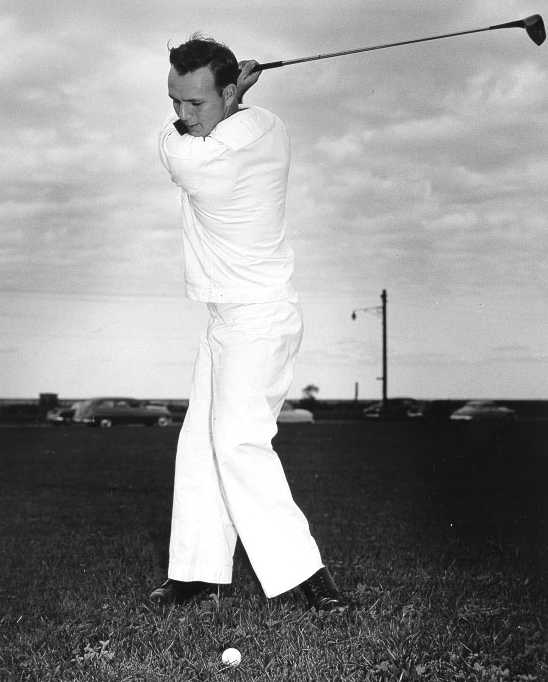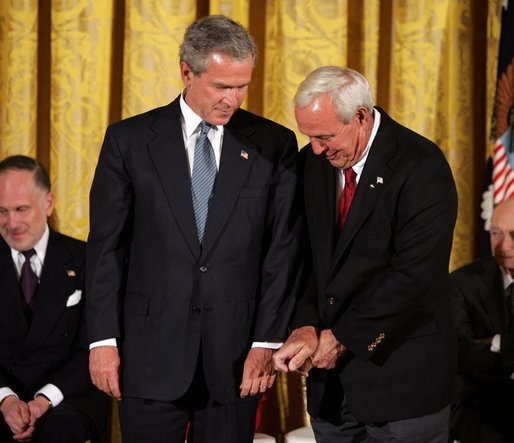For more than fifty years, Ill. Brother Arnold Palmer, 33°, was a leading man within the world of professional golf. His dominant reign during the 1950s and 60s propelled him to star status. He remains fifth on the PGA Tour’s winner’s list and was one of the World Golf Hall of Fame’s 13 original inductees. As a player, Palmer’s impact went beyond championships won, and titles earned. One of the game’s first-ever TV stars, he forever altered the culture of the game with his plain-spoken demeanor, expanding it beyond the greens of upper-class resorts and making it accessible to the common man.

After Palmer passed away, fellow golfer Jack Nicklaus said of him, “Arnold transcended the game of golf. He was more than a golfer or even a great golfer. He was an icon. He was a legend. Arnold was someone who was a pioneer in his sport. He took the game from one level to a higher level, virtually by himself.”
Childhood and Military Service
It was Arnold Palmer’s ascent despite his humble beginnings that made him such an inspiration to others. He was born in the blue-collar steel mill town of Latrobe, Pennsylvania, to parents Doris and Milfred Jerome “Deacon” Palmer. His father was the greenskeeper at the local country club, which only allowed members to golf on the green. As a young boy, he sometimes accompanied his mother to the club after dark, where he learned to play at a young age.

Starting to play during his childhood earned him a golf scholarship to Wake Forest College. Rather than completing his schooling and earning a degree, he left and joined the United States Coast Guard, where he served from 1951-1954. It was here that Palmer honed his skills as a player and got his first experience designing golf courses, something he would return to throughout his life. While at basic training in Cape May, New Jersey, he built a simple nine-hole pitch-and-putt course.
His time practicing in the service paid off, and in 1954 Palmer won the U.S. Amateur in Detroit. This pivotal moment showed him his true potential, and he decided to turn professional. Not long after this victory, he met his wife Winifred Walzer, to whom he would be married for 45 years until she passed away. Of his decision to go pro, Palmer notably said, “What other people find in poetry, I find in the flight of a good drive.”
Athlete of the Decade
This win marked the beginning of his most successful stretch of golf. In 1958 he won his first Masters tournament and would go on to win it four more times over the next six years. From 1960 to 1963 alone, he won 29 titles, and an Associated Press poll named him the “Athlete of the Decade.” In 1960, he was also named the Sports Illustrated “Sportsman of the Year,” and his fan base began to grow.
It was this period where his impact on the game was felt the most. Not only was he garnering significant attention from the media, but he turned his focus to international tournaments. At a time when American golfers didn’t give much thought to playing abroad, Arnold competed in the British Open, almost single-handedly globalizing the game. While he was runner up in 1960 during his first appearance at the tournament, he returned and won in 1961 and 1962.
Arnold Palmer Enterprises
Alongside amassing tournament victories, Palmer started and quickly grew his multi-divisional company. Arnold Palmer Enterprises became a global entity, and Palmer himself took a role overseeing a wide range of businesses. His businesses included automobile and aviation service firms and golf-centric ventures such as country clubs across the country. He had a hand in founding The Golf Channel and producing his own Arnold Palmer iced tea beverage line.

The Master Mason
Early in his career, Bro. Palmer became a member of Loyalhanna Masonic Lodge #275 in Pennsylvania. It was here he was raised to the Sublime Degree of a Master Mason and remained active for many years. He received the high honor of being made a 33° Scottish Rite Freemason in 1997 in the Northern Masonic Jurisdiction.
While his business and professional accomplishments were astounding, Palmer remains an inspiration to his brethren because of his generosity. He was a man who lived with the Masonic principle of Relief deep in his heart. For 20 years, Brother Palmer served as Honorary National Chairman of the March of Dimes Birth Defects Foundation. He helped fundraise for the Arnold Palmer Hospital for Children and Women in Orlando, Florida, and was a longtime member of the Board of Directors of the Latrobe Area Hospital.
His dedication to serving humankind was apparent for all to see. For his deeds, he received countless humanitarian awards. These include:
· Order of Eagle Exemplar (U.S. Sports Academy)
· Arthur J. Rain Award (Catholic Youth Association)
· Lawman Humanitarian Award
· Theodore Roosevelt Award (National Collegiate Athletic Association)
· Outstanding American Award (Los Angeles Philanthropic Foundation)
· Humanitarian Award, (Variety Club International)
· The “Good Guy” Award, American Legion National Commanders.
The King’s Legacy
Ultimately, Palmer’s career spanned more than six decades. Amazingly, Palmer won 62 PGA Tour titles from 1955 to 1973 and would go on to design over 300 golf courses in 37 states, 25 countries, and five continents. He competed in 50 consecutive Masters Tournaments before retiring in 2006. In honor of his professional and humanitarian achievements, Palmer was awarded the Presidential Medal of Freedom in 2004 and the Congressional Gold Medal in 2009.
Palmer passed to the Eternal Lodge on September 25, 2016, at the University of Pittsburgh Medical Center. Biographer James Dodson wrote of Brother Palmer,
“We loved him with a mythic American joy… He represented everything that is great about golf. The friendship, the fellowship, the laughter, the impossibility of golf, the sudden rapture moment that brings you back, a moment that you never forget, that’s Arnold Palmer in spades. He’s the defining figure in golf.”